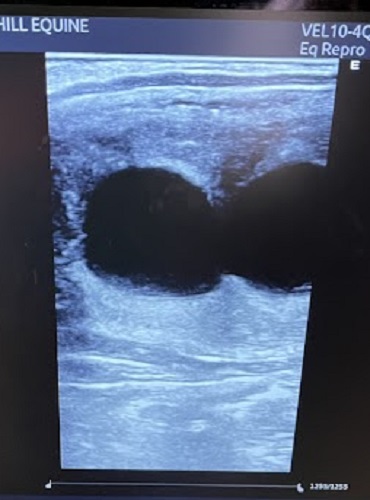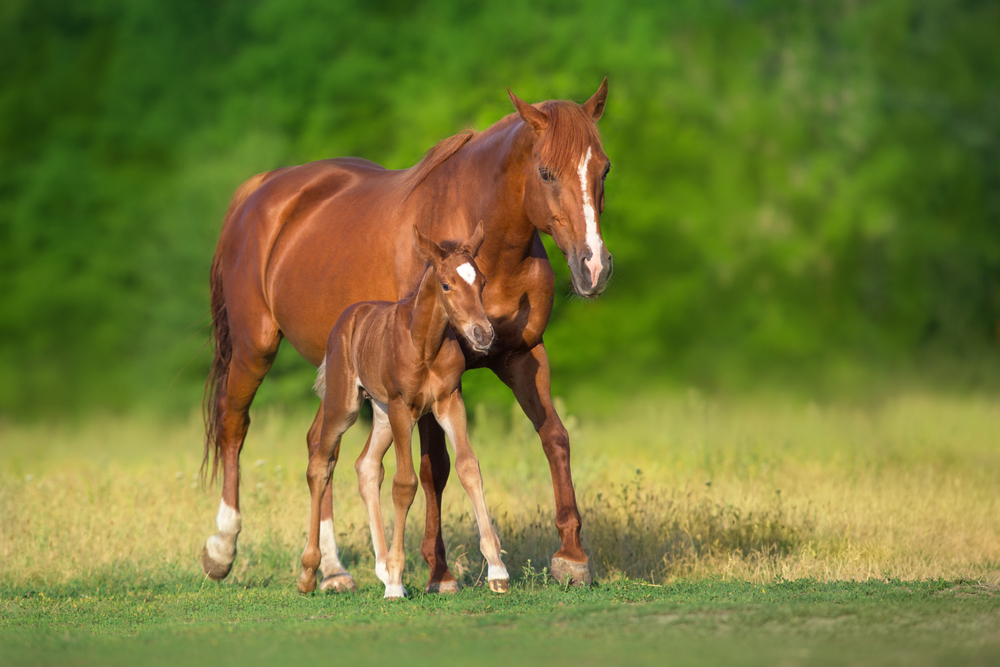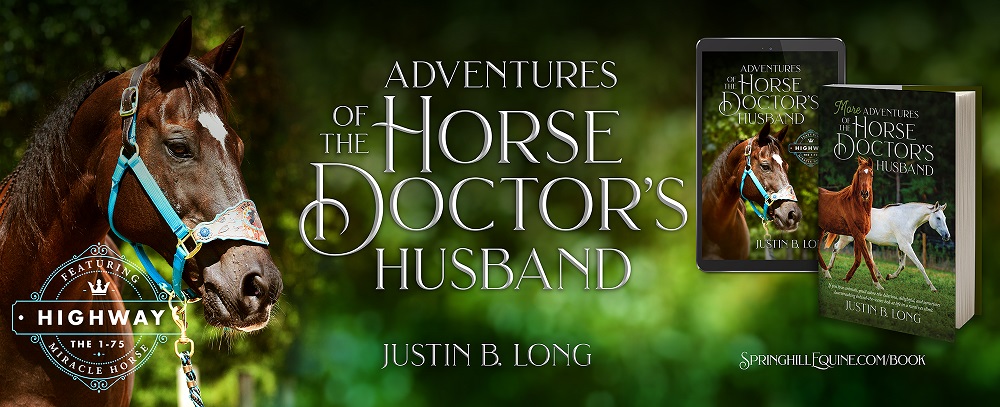Tuesdays with Tony
This past week has been a busy one at the clinic for me. All my paddocks have been full, and all my stalls occupied. I’m exhausted, but it’s been very rewarding to see all the foals frolicking in the paddocks. We are well into breeding season and have been performing pregnancy check after pregnancy check. These appointments are stressful yet rewarding. As the doctors are scanning the uterus looking for one little black dot, the suspense could be cut with a knife. As a cat, I can feel it as the mare’s owner, the doctors, and the technicians wait, then I hear it: the cheers that mean that a little black dot has been found! It’s heartbreaking when the dot isn’t found. And maybe even worse than not finding the black dot is seeing two black dots.

Twins
Double the dots does not mean double the fun. Two black dots on a pregnancy check means that there are two embryos developing, and two embryos means twins. Unlike many other animals, twins in horses is not a good thing. Fortunately, the development of two embryos is not super common, but when it happens, it’s important to know early on. That’s why my doctors always highly recommend a pregnancy check 14 days after known ovulation. There’s a very narrow window to deal with twins. Between days 14 and 20 of pregnancy is the only time that twins can be managed without major risks. We’ll talk about management of twins while in-utero and what can be done to ensure the birth of a single healthy foal, but first let’s discuss what happens when twins are not managed in-utero.
At your mare’s 14-day pregnancy check, your veterinarian will thoroughly examine your horse’s uterus and ovaries via transrectal ultrasound to find a pregnancy and ensure that only one embryo is found. If two embryos are found, the suggestion will be to “crush” or “pinch” one of the embryos. A mare’s uterus is not capable of carrying two healthy foals to term. The likelihood of a mare having twins that survive to foaling is extremely rare. If a mare does foal out twins, it’s unlikely that one or both of the twins will survive for more than a day or two.
If twins are not detected between 14 and 20 days of pregnancy, aborting the pregnancy becomes one of the options early on. To do this, a medication is administered to the mare which gets rid of the Corpus Luteum. The Corpus Luteum produces progesterone which helps maintain a pregnancy. Once the Corpus Luteum is gone, the embryos won’t be able to survive. After 150 days of pregnancy, the Corpus Luteum no longer holds the pregnancy and endometrial cups take over to provide progesterone and maintain pregnancy. If twins are not detected until after 150 days of pregnancy, aborting one or both of the fetuses becomes extremely difficult and dangerous. Transabdominal procedures are performed to abort a fetus, which puts the other fetus as risk for abortion as well.
Incomplete Ossification of Cuboidal Bones
If a mare carries twins to term and both survive, it’s likely that they won’t be developed completely. Despite being born full-term, when twins are born, they come out as premature foals. One problem that premature foals have is lack of bone development. More specifically, the small bones of the carpus (knee) and hock do not develop before birth in premature foals and in this case, twins. During the development process in-utero, the cuboidal bones in the carpus and hock start off as cartilage and turn into bone in the later stages of development.
When twins are born, their bones usually aren’t developed, and they have a significant amount of cartilage present in these joints. If foals were like human babies and laid around all day, having knees and hocks made of cartilage wouldn’t be an issue because they wouldn’t be holding up 200 pounds on cartilage alone. When the weight of a foal is placed on cartilage, it crushes the cartilage so that when bones develop, they’re misshapen and will develop arthritis before the foal is even a few months old. As you can imagine, this leads to a very painful, difficult life for the foal from day one.
Lung Development
To go along with the prematurity of twins is the lack of lung development at birth. The last thing to develop before a foal is born is their lungs. That’s why we never induce foaling unless we absolutely have to. When twins are born and have premature traits, one of the largest concerns is their lung develop (or lack thereof). When their lungs are not developed appropriately, they can’t get enough oxygen to survive. Without supplemental oxygen they will not thrive, not grow, and will be prone to illness.
Other Developmental Issues
Because twins have to share a placenta that can’t fully support them completely, they are born small and are more prone to developing illnesses. Being small in stature makes nursing difficult and increases the risk of developing aspiration pneumonia. They may require an indwelling feeding tube and being fed every few hours via the tube. The mare may not develop enough colostrum to supply both foals with enough antibodies to supply them with a strong immune system. When a twin does not get enough colostrum, they require treatment with intravenous plasma to ensure they have appropriate antibodies to fight off diseases and illnesses. Twins will require intensive treatment, they often require hospitalization, and they are not easy. Moreover, they are not cheap.

The moral of the story is, have your brood mares monitored early, monitored frequently, and appropriately cared for should twins be found on 14-day pregnancy ultrasound. While it might seem like you are getting more bang for your buck if twins are found, listen to your veterinarians and their recommendations if twins are found. It is, in fact, a life or death scenario for the foals and the mare.
Until next week,
~Tony
P.S. If you’ve ever read any of my post scripts, then you know about the Podcast and the YouTube Channel, and you’ve subscribed to both. You’ve also probably already scrolled down and subscribed to my blog. So, really, you’re plugged into all the things, and absorbing horse knowledge in every way that I have to share it. Pat yourself on the head, and give yourself a treat, becaue you are a good human.
Tuesdays with Tony is the official blog of Tony the Clinic Cat at Springhill Equine Veterinary Clinic in Newberry, Florida. If you liked this blog, please subscribe below, and share it with your friends on social media! For more information, please call us at (352) 472-1620, visit our website at SpringhillEquine.com, or follow us on Facebook!
[jetpack_subscription_form title="Subscribe to Whinny's Wisdoms"]

